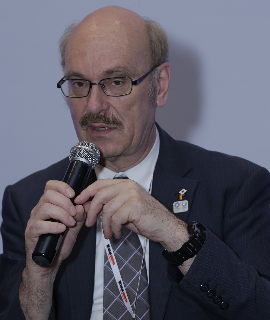Title : Greening the Maritime Industry with Carbon-Negative Biofuel
Abstract:
Our bio-oil conversion system (BOC) can crack with the help of catalysts, heat, and mechanical stress the long hydrocarbon chains of lignocellulosic biomass into shorter chains in the diesel fuel range. This technology has been proven in multiple tests, and we have now developed a highly efficient technology for the energy input and conversion process.
Biofuel is frequently criticized for direct or indirect land-use change and considered not sufficiently scalable without reopening the dilemma “plate-or-tank.” To avoid these problems, we are concentrating on biomass waste, like sugarcane trash, rice and wheat straw, etc., from customary field-incinerated agricultural crop waste. According to United Nations’ UNEP and the CCAC based on NASA satellite photos, every year about 10.5 billion metric tons of waste are worldwide incinerated. The fires release approximately 16.6 billion tons of CO2, and emit 9.8 billion tons CO2eq (CO, methane), 1.1 billion tons of smog precursors, and 66 million tons of PM2.5 and other harmful substances causing air pollution and approximately 1 million premature deaths.
Theoretically, we can convert this material with minimal CO2 emissions for collecting and preprocessing and no land-use change into 2.5-3 billion tons of fuel oil conforming to ISO 8217, while the maritime industry consumes “only” 300 million t/a. Avoided CO2 emissions are considered for the LCA, rendering our footprint carbon-negative (climate, positive)
Further refined road diesel according to EN 590/ASTM D 975 and even aviation fuel SAF could be possible.




